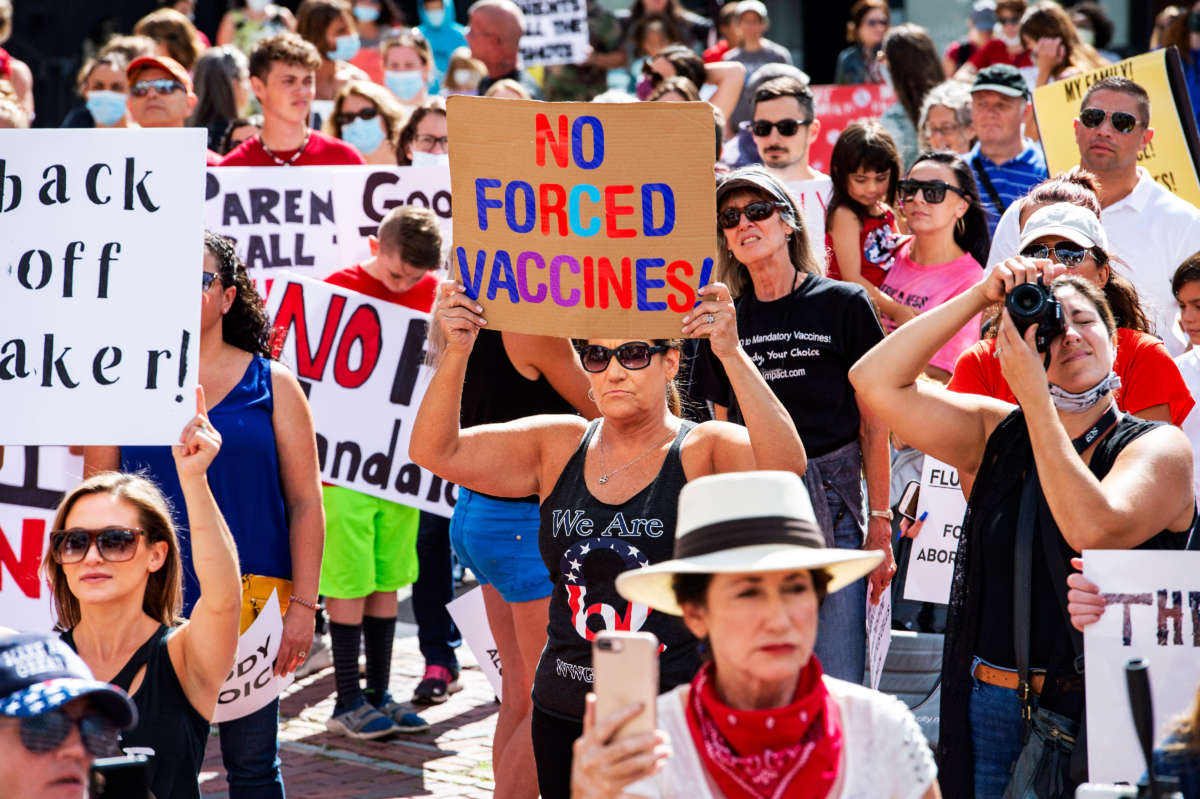Although former President Donald Trump has now strongly urged everyone in the U.S. to get vaccinated against COVID-19, a number of his most ardent supporters — particularly those who subscribe to the QAnon set of conspiracy theories — are continuing to express skepticism about the vaccines. Some have even started spreading baseless conspiracy theories claiming that the person who promoted the COVID vaccines in a video interview with Fox News wasn’t really Trump.
During his interview with Fox News on Tuesday, Trump gave a strong endorsement to the vaccines, while still suggesting people had the choice to make up their own minds on whether to get one or not.
“I would recommend it, and I would recommend it to a lot of people that don’t want to get it. And a lot of those people voted for me, frankly,” Trump acknowledged. “But, you know, again, we have our freedoms and we have to live by that, and I agree with that also.”
“But it’s a great vaccine, it’s a safe vaccine, and it’s something that works,” he added.
Prior to his Fox News interview, Trump had been less vocal than other former presidents about encouraging Americans to get vaccinated. Notably, he did not take part in a public service ad campaign that featured every other former president who is still alive. And rather than receive his COVID-19 vaccine in a public way, to motivate others to get vaccinated and to show that the vaccines are safe, Trump chose to receive his COVID-19 vaccine privately before leaving the White House, in contrast to what other former presidents have done.
Polling shows that skepticism about the coronavirus vaccines is higher among Trump supporters. Fifty-six percent of Americans in a recent Economist/YouGov poll say they are planning to be vaccinated or have already received at least one shot, with only 43 percent saying they will not get vaccinated or aren’t sure about doing so. But those numbers are flipped when it comes to voters who selected Trump in the presidential race last fall, with only 46 percent of his supporters saying they will or have gotten vaccinated, and 54 percent saying they won’t or aren’t sure about doing so.
Skepticism over Trump’s words this week was evident within the QAnon conspiracy movement, with many individuals in chat groups even going so far as to claim that the interview with the former president on Tuesday was faked.
One user in a QAnon group said the way Trump “greeted Maria [Bartiromo of Fox News] and how he spoke to her” indicated that it “wasn’t him” speaking during the interview, according to reporting from Newsweek.
“I saw and heard a lot of interviews between him and Maria that wasn’t like he speaks to her normally and it wasn’t his voice at all…. Me and some other people noticed this immediately,” the user, nicknamed Mary Cue, hypothesized.
Other members of the same chat group suggested that if it was Trump who was speaking during the interview, he had been “compromised” and possibly even “blackmailed” into supporting the distribution of the vaccine.
QAnon members are highly suspicious of the vaccines that are available to stop the spread of COVID-19. Many have promulgated preposterous theories about the vaccine causing people to become homosexual or transgender.
Trump’s words were not enough to convince these ardent conspiracy theorists to change their minds — but there’s evidence to suggest even mild Trump supporters who are skeptical of COVID-19 vaccines aren’t necessarily looking to him for guidance on this issue. Responses from a focus group of Trump voters who are not sure yet about getting vaccinated suggest that many of the former president’s loyalists are more likely to be persuaded not by political figures, but by doctors and experts themselves.
“We want to be educated, not indoctrinated,” said one participant in the focus group, which was convened by conservative pollster Frank Luntz.
“What I don’t trust is the government telling me what I need to do when they haven’t led us down the right road,” another participant explained.
Confounding Luntz, participants even said that a PSA from Trump wouldn’t change their minds. “Those people are beginning to move on” from the former president, Luntz suggested.
Participants were more moved, in fact, by the words of Tom Frieden, a doctor who provided facts and information to the group that alleviated concerns about the long-term effects of the vaccines, including by mentioning that doctors themselves were getting vaccinated for protection against the virus. (Luntz did not mention to participants that Frieden once led the Centers for Disease Control and Prevention under former President Barack Obama.)
Such findings seem to reinforce comments made by President Joe Biden earlier this week. When asked by reporters whether his administration ever considered reaching out to Trump to promote a bipartisan message on the vaccines to dissuade Trump supporters’ skepticism, Biden said his administration opted against that idea.
“I discussed it with my team, and they say the thing that has more impact than anything Trump would say to the ‘MAGA folks’ is what the local doctor, what the local preacher, what the local people in the community say,” Biden explained. “So I urge all local docs and ministers and priests to talk about why, why it’s important to get that vaccine and even after that, until everyone is, in fact, vaccinated, to wear this mask.”
Speaking against the authoritarian crackdown
In the midst of a nationwide attack on civil liberties, Truthout urgently needs your help.
Journalism is a critical tool in the fight against Trump and his extremist agenda. The right wing knows this — that’s why they’ve taken over many legacy media publications.
But we won’t let truth be replaced by propaganda. As the Trump administration works to silence dissent, please support nonprofit independent journalism. Truthout is almost entirely funded by individual giving, so a one-time or monthly donation goes a long way. Click below to sustain our work.
